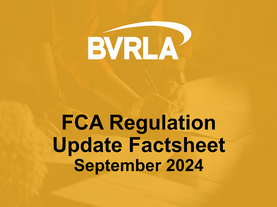The FCA's new Consumer Duty regime brings a significant change in how regulated firms need to operate. Below, we address Frequently Asked Questions (FAQs) to support members through this process. Contact the team directly if you require further assistance.
The BVRLA's Compliance team can be reached via telephone: 01494 545739 and email: [email protected]
What differences would the FCA expect to see in how smaller firms and Limited Permission firms apply the Consumer Duty compared to how bigger firms apply the Duty?
All firms should aim to deliver good outcomes for their customers but the FCA understand that smaller firms may not have the same resource to apply to the duty as a bigger firm. For instance, in outcomes testing- firms with more sophisticated abilities within their firms will likely have more a detailed approach to testing and MI production. Firms should ensure that their capabilities are consistent across the firm i.e. if sophisticated processes are used in relation to sales, they should also be used in relation to outcomes testing. Larger limited permissions firms should apply the Duty based on the size and capability of their firm, not solely based on the fact that their credit broking permissions are limited.
For smaller businesses, where the Approved Person may hold multiple Senior Management functions, must an independent Consumer Duty Champion be appointed, or can this be included in the Prescribed Responsibility of the SMF?
The Consumer Duty champion role should be set up in a way that suits the structure of the organisation. It is not a prescribed responsibility and it does not impact the existing responsibilities. It is something over and above the PR’s and is designed to ensure that Consumer Duty has enough of a stage in the firm and therefore should remain separate.
Where firms work as part of a distribution chain there could be some repetition on information provided to/asked of the Consumer. Can information transfer can be delegated throughout the distribution chain to avoid repetition?
The scope of the Consumer Duty is intentionally broad and applies to manufacturers, distributors, and all other firms in the distribution chain. There are no new disclosure requirements under Consumer Understanding- firms have the flexibility to consider the best way to communicate with consumers and should use their judgement to ensure that they are doing so in the best way to deliver good outcomes. It’s also worth considering the information that is being communicated- where information is particularly difficult to understand, repetition is not always a negative thing.
In some distribution chains lenders will be working directly with introducers, such as Motor Dealerships, who are then working with a third-party broker. To what extent do the FCA expect that Lenders should assess everyone in the distribution chain?
Firms are responsible only for their own activities unless contractually or otherwise obliged. While the lender is not responsible for the rest of the distribution chains compliance with the Duty, they should have a distribution plan including the target market and how they believe their product should be distributed. If they become aware that this is not being complied with, they should take action. This will require good oversight.
Does the Duty put more responsibility onto leasing brokers to assess affordability? Will the FCA set affordability buffer thresholds?
The consumer duty does not create new rules on affordability. In light of the duty, firms should consider their approach on affordability and whether it allows them to achieve good outcomes and prevent harm to customers. The FCA will not set rules on amounts.
When are the services a broker provides merely the activities necessary for a distributor and when do they become something that makes them a manufacturer of the credit broking service and therefore subject to the rules for manufacturers?
The lender is likely to be the manufacturer of the design and pricing of the product and the broker the distributor of this product. The broker should, however, consider the target market and meeting the needs of this target market. Brokers should ensure that they remain compliant with the Products and Services outcome and should consider this if they remain unsure.
With a Salary Sacrifice scheme product, the agreement is between employer and lender, which is an unregulated agreement and out of scope of the Duty. If the employee uses the vehicle for non-business purposes, does the Duty extend to the employee?
The duty builds on existing regulation rather than extending the application of current FCA rules. It does not apply to un-regulated products or un-regulated lending- so the Duty would not apply in this instance even though the vehicle may not be used solely for business purposes. Firms should ensure that they consider what services may be considered ancillary to the regulated services when applying the duty.
Are ancillary services such as maintenance packages (that are not regulated services themselves but are connected to regulated products) included in the scope of Consumer Duty?
Where the service is carried out in relation to a regulated activity and completion of the regulated activity does not depend on completion of the unregulated activity this will not be classed as ancillary. The unregulated activity is then not bought into the scope of the Duty.
What additional characteristics of vulnerability need to be considered, aside from financial, in the Motor Finance sector under Consumer Duty? Does the FCA expect firms to monitor temporary vulnerability, and should this be logged and recorded?
Firms should consider both permanent and temporary causes of vulnerability and should act accordingly. Where firms are unsure, they should refer to the fair treatment of vulnerable customers guidance.
Are OEM’s classed as distributors under the Duty? I.e. where an OEM supplies a vehicle to a party in the distribution chain and the vehicle supplied is subject to the Consumer Credit Act, is the OEM subject to the Duty?
The Duty only applies to FCA regulated firms (those who offer, sell, arrange, deal, propose or advise on the financial product). As such, the Consumer Duty is unlikely to apply to the OEM.
What is the position under the Consumer Duty if a customer applies for credit based on a displayed representative rate but is then offered a different rate based on their credit rating?
The representative APR will not be applicable for everyone who applies for credit, for a number of reasons. Firms should be aware of FCA rules on difference in commission charges where this applies and where this can alter the rate offered. Lenders have a responsibility to ensure that the rate is being targeted right if the rate is causing dissatisfaction.
Can the FCA provide any detail on outcomes testing and what good looks like?
The FCA guidance on Consumer Duty sets out expectations for monitoring and the kinds of things that firms should be looking at to monitor good outcomes.
Return to the Consumer Duty guidance page




